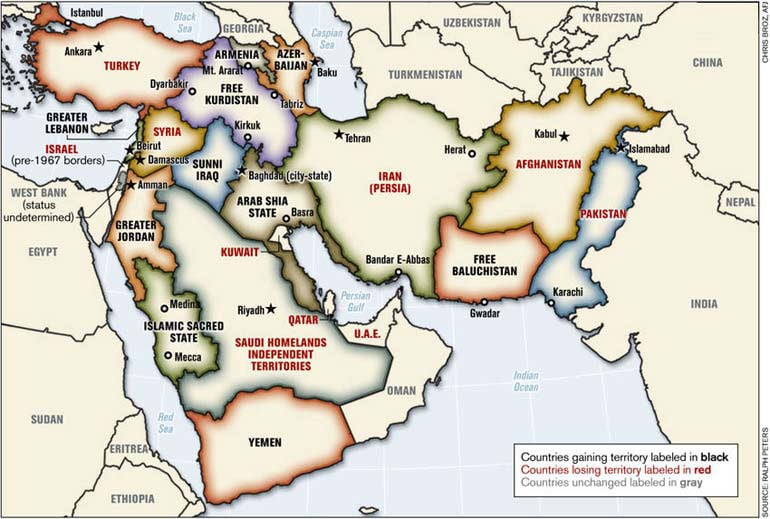Lebanon: Daily Star
Arab states in the Gulf have the capability to respond to any attack from Iran, Bahrain's defense minister said in an interview published on Sunday. Meanwhile, Israel and the US are conducting a large-scale missile-defense exercise aimed at combining their systems, US and Israeli officials said Sunday, as both countries warned that Iran could obtain nuclear weapons and long-range missiles.
"Gulf countries are able to defend themselves against Iran ... We have the military strength and capability," Defense Minister Khalifa bin Ahmad al-Khalifa told Al-Hayat newspaper.
He added that any conflict between Western powers and Iran over its controversial nuclear program would impact other states in the region, including Bahrain.
He also warned against Western plans to re-draw the region and divide it into "mini-states." "One the most significant, if not most dangerous, challenges facing the Arab and Gulf countries today are attempts and schemes to partition the Arab world. This is evident in the operations taking place in Iraq, Sudan and Somalia," he said.
He added, though, that "we do not want to put the blame on the entire West," singling out France and Germany as examples of Western countries that have "a different perspective of the Middle East," while other countries "take the position of Israel on some issues."
The minister said Bahrain, as well as other Arab states, would "respond with force to defend itself" if Iran blocked the strategic Strait of Hormuz in the event of a confrontation over its nuclear drive. The strait at the southeastern tip of the Gulf separates Oman from Iran.
Almost all crude exports from Arab Gulf states go through the strait, making it the world's most important oil passage.
What is this "redrawing" national boundaries? Here is a map that has floated a training program at NATO's Defense College for senior military officers and most probably the National War Academy as well as in military planning circles. The map does not officially reflect Pentagon doctrine, but it's implications are obvious.

GlobalResearch.ca
Secretary Condoleezza Rice stated during a press conference that “[w]hat we’re seeing here [in regards to the destruction of Lebanon and the Israeli attacks on Lebanon], in a sense, is the growing—the ‘birth pangs’—of a ‘New Middle East’ and whatever we do we [meaning the United States] have to be certain that we’re pushing forward to the New Middle East [and] not going back to the old one.â€1 Secretary Rice was immediately criticized for her statements both within Lebanon and internationally for expressing indifference to the suffering of an entire nation, which was being bombed indiscriminately by the Israeli Air Force.
[..]This map of the “New Middle East†seems to be based on several other maps, including older maps of potential boundaries in the Middle East extending back to the era of U.S. President Woodrow Wilson and World War I. This map is showcased and presented as the brainchild of retired Lieutenant-Colonel (U.S. Army) Ralph Peters, who believes the redesigned borders contained in the map will fundamentally solve the problems of the contemporary Middle East.
The map of the “New Middle East†was a key element in the retired Lieutenant-Colonel’s book, Never Quit the Fight, which was released to the public on July 10, 2006. This map of a redrawn Middle East was also published, under the title of Blood Borders: How a better Middle East would look, in the U.S. military’s Armed Forces Journal with commentary from Ralph Peters.5
It should be noted that Lieutenant-Colonel Peters was last posted to the Office of the Deputy Chief of Staff for Intelligence, within the U.S. Defence Department, and has been one of the Pentagon’s foremost authors with numerous essays on strategy for military journals and U.S. foreign policy.
It has been written that Ralph Peters’ “four previous books on strategy have been highly influential in government and military circles,†but one can be pardoned for asking if in fact quite the opposite could be taking place. Could it be Lieutenant-Colonel Peters is revealing and putting forward what Washington D.C. and its strategic planners have anticipated for the Middle East?
The concept of a redrawn Middle East has been presented as a “humanitarian†and “righteous†arrangement that would benefit the people(s) of the Middle East and its peripheral regions. According to Ralph Peter’s:
"International borders are never completely just. But the degree of injustice they inflict upon those whom frontiers force together or separate makes an enormous difference — often the difference between freedom and oppression, tolerance and atrocity, the rule of law and terrorism, or even peace and war."


No comments:
Post a Comment